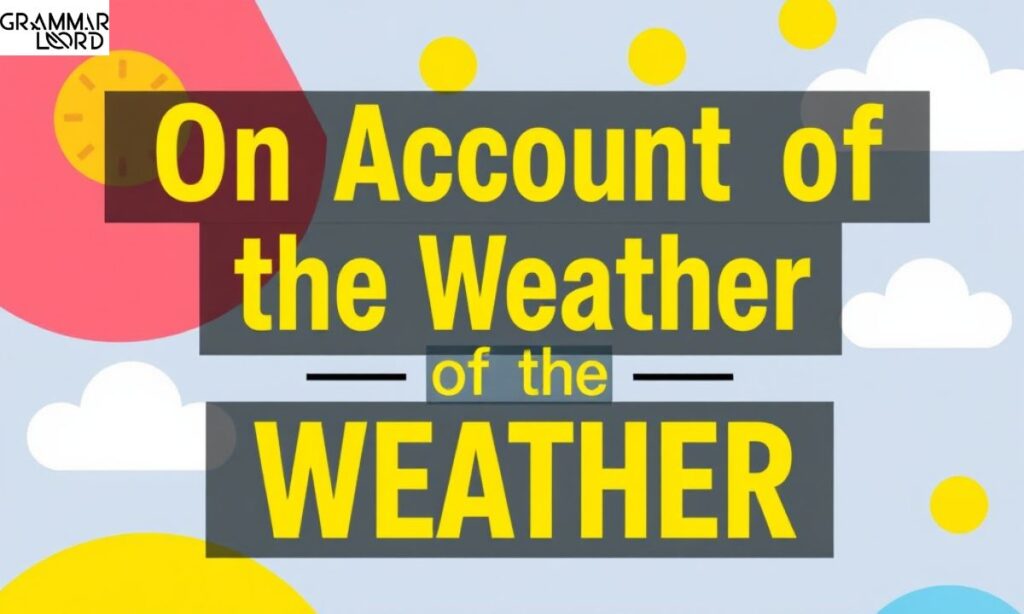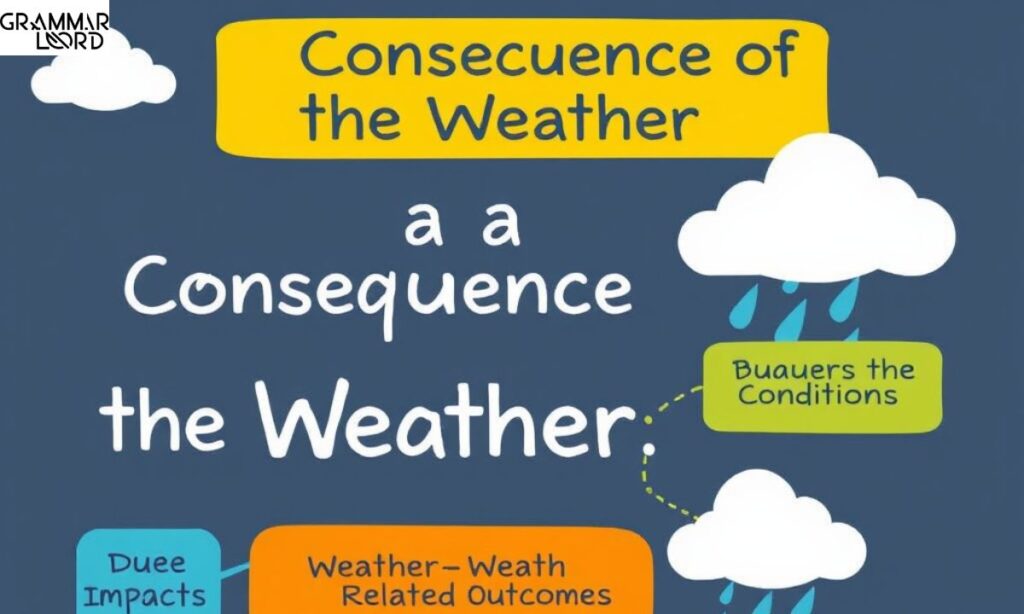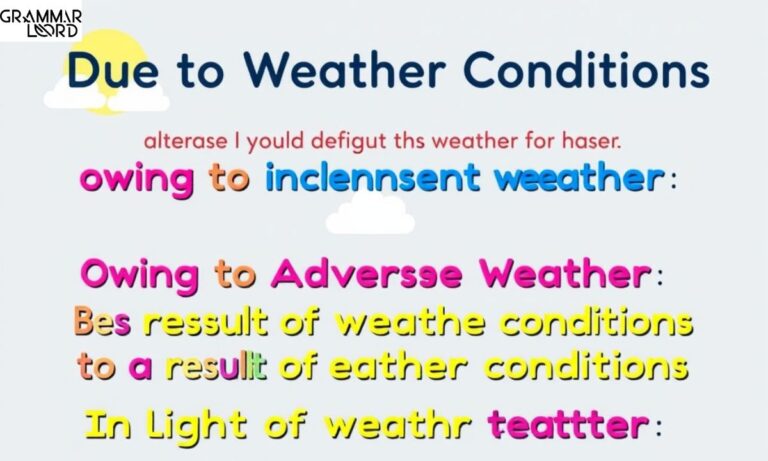Weather-related disruptions often require alternative ways to express the impact of changing conditions. Instead of saying “due to weather conditions,” you can use phrases like “because of inclement weather,” “owing to adverse weather,” or “affected by changing weather patterns.” These variations enhance clarity and make communication more engaging.
Because of Inclement Weather
Inclement weather often leads to travel delays, cancellations, and disruptions in daily activities. This phrase is commonly used in formal announcements and official communications.
Schools, businesses, and transportation services frequently use it to inform people of schedule changes. It highlights how severe weather impacts plans and safety measures. Using this phrase ensures clarity in professional and public settings.
Owing to Adverse Weather
Adverse weather conditions can create hazardous situations, affecting outdoor events and travel. This phrase is widely used in news reports and weather warnings.
It emphasizes the negative impact of extreme weather, such as storms or heavy snowfall. Businesses often use it to notify customers about service disruptions. It conveys a strong sense of urgency and precaution.
As a Result of Severe Weather
Severe weather can lead to widespread disruptions, including power outages and transportation issues. This phrase effectively communicates the cause-and-effect relationship of weather-related problems.
It is commonly used in news updates and emergency alerts. Governments and organizations use it to inform the public about safety measures. It helps convey the seriousness of weather-related disruptions.
On Account of the Weather

This phrase is often used in everyday conversations to explain delays or changes in plans. It provides a more casual yet clear way to express weather-related impacts.
People use it when discussing canceled flights, postponed events, or travel delays. It is suitable for both spoken and written communication. This phrase ensures that the reason for changes is easily understood.
Due to Poor Weather
Poor weather conditions can affect outdoor activities, travel, and business operations. This phrase is commonly used in formal settings to explain schedule changes.
It is often seen in official notices from airlines, schools, and event organizers. It emphasizes the role of weather in causing inconvenience or safety concerns. It is a straightforward way to communicate weather-related issues.
Caused by Extreme Weather
Extreme weather events, such as hurricanes and blizzards, can disrupt normal life significantly. This phrase highlights the intensity of weather conditions and their effects.
It is commonly used in reports detailing damage, emergency responses, or closures. Businesses and government agencies use it to explain delays or interruptions. It effectively conveys the severity of the situation.
Thanks to Unpredictable Weather
Unpredictable weather can make planning events and travel challenging. This phrase adds a slightly informal or ironic tone when explaining changes.
It is often used in casual conversations and social media updates. People use it to express frustration or humor about unexpected weather changes. It works well in both spoken and written communication.
Weather Permitting Issues
This phrase is often used when planning outdoor activities or construction projects. It indicates that certain events or tasks depend on stable weather conditions.
Businesses, event organizers, and travelers use it to express uncertainty. It helps prepare audiences for potential last-minute changes. It ensures clarity when scheduling weather-dependent activities.
Attributed to Bad Weather
Bad weather can lead to multiple disruptions, including transportation delays and power failures. This phrase is often used in reports explaining the cause of an issue.
It helps highlight the direct impact of poor weather conditions on daily life. Businesses and news agencies frequently use it in official statements. It is a professional way to explain weather-related challenges.
Due to Unfavorable Weather
Unfavorable weather can force changes in travel plans, work schedules, and outdoor events. This phrase is commonly used in formal and professional settings.
It conveys that the weather is unsuitable for specific activities. Airlines, schools, and event planners frequently use it in announcements. It effectively communicates the reason for disruptions.
Impacted by Stormy Conditions
Stormy conditions can cause flooding, road closures, and power outages. This phrase is useful when describing the effects of storms and heavy rainfall.
It is often used in news reports, weather forecasts, and emergency alerts. Businesses use it to explain delivery delays or service disruptions. It conveys the seriousness of weather-related issues.
As a Consequence of the Weather

This phrase is commonly used to describe the outcomes of weather-related events. It emphasizes the cause-and-effect relationship between weather and disruptions.
It is often seen in formal reports, news articles, and official statements. Governments and businesses use it to explain the impact of natural disasters. It ensures a professional and informative tone.
Hindered by Harsh Weather
Harsh weather conditions can slow down travel, construction, and outdoor work. This phrase effectively describes situations where weather creates obstacles.
It is commonly used in business reports and news updates. It conveys that progress or activities have been affected by difficult weather. It is a clear way to communicate delays and challenges.
Disrupted by Climatic Conditions
Climatic conditions can vary widely, causing significant changes in daily life. This phrase is useful for discussing long-term weather patterns and their effects. It is often used in environmental reports and scientific discussions.
It highlights how weather conditions influence travel, agriculture, and business operations. It provides a broad and professional way to describe weather-related disruptions.
Affected by Changing Weather Patterns
Changing weather patterns can cause unexpected temperature shifts, storms, and droughts. This phrase is often used in climate-related discussions and news reports.
It explains how unpredictable weather impacts different industries and daily activities. It is frequently used in scientific studies and environmental reports. It highlights the ongoing impact of weather variations on human life.
Frequently Asked Questions
Why should I use alternatives to “due to weather conditions”?
Using different phrases improves clarity, professionalism, and engagement in communication.
Where can I use these alternative phrases?
You can use them in news reports, business announcements, weather updates, and casual conversations.
Which phrase is best for formal communication?
Phrases like ‘owing to adverse weather’ or ‘as a result of severe weather’ are ideal for formal settings.
Can I use these phrases in everyday conversations?
Yes, informal options like on account of the weather work well in daily speech.
How do these phrases help in professional writing?
They enhance readability, ensure precision, and make weather-related updates sound more professional.
Conculsion
Weather conditions can greatly impact travel, events, and daily activities. Using different phrases to describe weather-related disruptions helps improve communication. Whether in formal reports, business announcements, or casual conversations, choosing the right expression ensures clarity and professionalism.
By using alternatives to “due to weather conditions,” you can make your writing more engaging and precise. These phrases help convey the severity, cause, and impact of weather on various situations. Clear and effective communication is essential, especially when informing people about weather-related changes.

